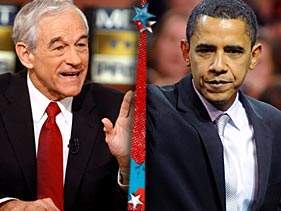Ron Paul: 5 reasons why the GOP probably won't nominate him in 2012 if he decides to run again

Dr. Paul set two, one-day internet fundraising records in 2007. He was the only GOP presidential candidate to warn of an imminent economic crisis. He was the only GOP candidate to even acknowledge that the United States was already mired in a recession in 2007/2008.
When the financial collapse hit, he was the most sought after GOP interview on Fox, CNN, MSNBC, CNBC, and other major media outlets. Recently, he won the CPAC straw poll, came in a close second at the SLRC straw poll, and virtually tied President Obama in a hypothetical 2012 matchup, with Independents giving him a whopping 19% advantage.
As impressive as this resume may be, however, Dr. Paul remains near the bottom of the list in most GOP presidential polls. Recent polls have put him in the 8-11% range, far behind potential nominees such as Mitt Romney, Newt Gingrich, Mike Huckabee, and Sarah Palin.
Based on these consistently low poll numbers in GOP-specific surveys, I'd like to present five arguments why I believe it is highly unlikely that the Republican Party would nominate Dr. Paul in 2012.
Considering that the next Presidential election is over two years away, and that Dr. Paul hasn't even announced his candidacy, these arguments are admittedly speculative in nature. Even so, they are worth examining since Dr. Paul's name recognition has significantly grown over the past couple of years.
Argument #1: The GOP will not accept Ron Paul's anti-war, non-interventionist, fiscally conservative foreign policy. Most Republicans support the Afghanistan and Iraq Wars, as well as the nearly $1 trillion "Bush-Obama" military budget.
The GOP still overwhelmingly supports an offensive-minded, globally-based, pre-emptive War on Terror, no matter the fiscal cost, while viewing Ron Paul's foreign policy as weak and representative of the "Blame America" crowd.
Even his son's recent primary victory in Kentucky appeared to prove that Republicans still aren't receptive to Ron's foreign policy platform. Unlike his father, Rand supports keeping Guantanamo Bay open, trying suspected/actual terrorists in military tribunals instead of federal courts, not immediately withdrawing from Afghanistan and Iraq, and allowing the President & Generals on the ground to determine troop levels in both war theaters.
Argument #2: Dr. Paul is not part of the party machine. He was the only Republican to be a consistently vocal critic of the Bush-Cheney administration's expansion of government, huge budget deficits, explosive debt, encroachment upon civil liberties, and devaluation of the Dollar.
Republicans prize party loyalty, and Congressman Paul's voting record makes him an unpredictable, independent-minded renegade.
Argument #3: The Republican Party still views Congressman Paul as too eccentric. His libertarian-leaning views, especially in light of recent events surrounding his son's Senatorial candidacy, would likely be viewed as a burdensome liability come election time.
Argument #4: Despite his impressive showing against President Obama in the Rasmussen Poll, the GOP views Paul as completely unelectable. His hyper-fiscal conservatism, perceived weakness on war policy, and lack of "presidential" qualities are construed as deal breakers.
It should be noted that last year, Mitt Romney also tied Barack Obama in a Rasmussen Poll, and like Paul, beat Obama in the Independent category, though by a much smaller margin. The difference is, Mitt Romney is a GOP superstar, while Paul is not.
Argument #5: Rand Paul's recent controversy over Civil Rights and his comments regarding BP could prove detrimental to his father's potential 2012 presidential bid. Forced to defend his son, Ron could be portrayed as a Republican who is "out of touch" with mainstream America, particularly minorities.
While Dr. Paul may be the GOP's purest fiscal conservative, champion of limited government, and most prescient economist, it seems doubtful that he would fare much better in 2012 compared to 2008.
That is why, if he decides to run, he may want to consider an Independent bid. Independents are the largest and fastest growing segment of the national electorate, Americans are growing increasingly frustrated with both major parties, and Dr. Paul can appeal to a wide swath of voters on a number of issues.
For example, his Audit the Fed bill received strong bipartisan support. His anti-war, non-interventionist foreign policy is well-received by libertarian-leaning Republicans, liberal Democrats, and some Independents. His staunch fiscal conservatism, in an era of crippling debt, receives strong support from Blue Dog Democrats, Republicans, and Independents.
Also, his support for the legalization of marijuana and his unwavering defense of civil liberties, even in times of war, draws support across the political spectrum.
Finally, his reputation for standing up to both major parties could be an advantage in a climate where 31% of Americans want a 3rd party.
The logistics of an independent, third party bid would certainly be difficult, especially in an environment that overtly favors the two-party system, but with an army of rabid supporters, the ability to raise record amounts of cash, and multi-partisan support on an array of issues, Dr. Ron Paul could prove more competitive than people think.
That's my opinion. What's yours?





